Chinglish bumper crop
« previous post | next post »
Depending on your attitude to Chinglish, it is getting better / worse all the time. The latest batch I received comes from a Weixin (WeChat) site named "Sì dà fāmíng 四大發明" (translation: "Four Great Inventions", though they simultaneously treat that as a transcription: "Star Farming").
Apart from nearly two dozen photographically documented Chinglish signs, the whole site is full of such word play, so much so that one begins to suspect a pun (often totally gratuitous) at every turn. Here are just a couple from this site:
wāiguǒ 歪果 ("crooked fruit") for wàiguó 外國 ("foreign")
mámá 麻麻 ("hemp-hemp; cannabis-cannabis; pocky-pocky") for māmā 媽媽 ("mother"), with the expletive wǒ de mā ya 我的妈呀 ("mama mia; my mother!") strongly implied.
One almost begins to sympathize with the language police who would like to ban such ubiquitous, flippant punning:
- "Punning banned in China " (11/29/14)
- "It's not just puns that are being banned in China " (12/7/14)
I will not explain all of the signs on the site, in the first place because I've already blogged on about one quarter of them, or have explained other signs that are basically dealing with the same Chinglish usage:
- "Drawing a line in the noodles " (8/14/11)
Two of the photographs on the site under discussion are the result of the same translation error, so I'll just skip over them.
"F*ck Vegetables" and its numerous congeners has been treated repeatedly and at length on Language Log, e.g.:
- "The Etiology and Elaboration of a Flagrant Mistranslation " (12/9/07)
- "The further elaboration of a flagrant mistranslation " (8/31/13)
Likewise, "a time sex thing" has been treated here:
- "It's a time sex thing, baby " (8/8/07)
And "open water rooms" here:
- "Opens the waterhouse; open water rooms " (3/2/13)
Now, on to Chinglishisms not covered on Language Log before.
sēnlín shì wǒjiā 森林是我家
("the forest is our home")
fánghuǒ kào dàjiā 防火靠大家
("fire prevention depends on everyone")
The Chinese exhortation has been repeatedly covered on Language Log, e.g., "Signs from Kashgar to Delhi" (10/11/13), with links to earlier posts. What's remarkable about this sign is that the Chinglish translation is extremely free and creative (they were trying to say "fire in the hole", i.e., "pee into the urinal [not on the floor]").
gāogāoxìngxìng shàngxué 高高兴兴上学
("happily go to school")
xiǎoyuàn chūnshēn 小苑春深
("little garden replete with spring")
There is apparently a residency and park of this name over a century old that once belonged to a wealthy salt merchant of Yangzhou.
duìgōng yèwù zhuānchuāng 对公业务专窗
("special window for public services [i.e., business]")
měizhèng lù 美政路
("Excellent / Virtuous Governance Road")
Meizheng Rd. is a short street in Hangzhou that takes its name from a park located there.
měi 美 ("beautiful") — Měiguó 美国 (short for Měilìjiān hézhòngguó 美利 堅合眾國 ("United States of America")
qítuó sì 祇陀寺
("Jeta Monastery")
gōnggòng chǎngsuǒ jìnzhǐ xīyān 公共场所禁止吸烟
("public place, no smoking")
Lèshān yī zhōng 乐山一中
("Leshan First Middle School")
gāosù 高速 is short for gāosù gōnglù 高速公路 ("expressway")
qǐng wù xīyān 请勿吸烟
("please don't smoke")
yánjìn yānhuǒ 严禁烟火
("smoking prohibited")
jìnzhǐ dǎ shǒujī 禁止打手机
("no cell phone calls")
qǐng wù pāizhào 请勿拍照
("please don't take photos")
shuāngpīn nǎichá 双拼奶茶
(lit., "double milk tea" –> "milk tea with two add-ins")
nǎichá sān xiōngdì 奶茶三兄弟
(lit., "milk tea three brothers" –> "milk tea with three add-ins")
jízhěn shén nèikē 急诊神内科
("emergency neurology")
Note: shén 神 can mean "god; spirit; deity", but can also serve as an abbreviation for shénjīng 神经 ("nerve").
Ānníng 安宁 and Chǔxióng 楚雄 are the names of places in central Yunnan Province.
dàmǐ 大米
("rice")
xiǎomǐ 小米
("millet")
The confusion between "rice" and "meter" results from the fact that mǐ 米 means "rice" but it also serves as a transcription of "meter".
miànfěn 面粉
("flour")
The confusion with "face powder" results from the fact that, in simplified characters, miàn 面 ("face") also has to do double duty for miàn 麵 ("wheat").
méitǐ qiāndào chù 媒體簽到處
("place for media to sign in")
xiǎomǎibù 小买部
(lit., "section for small purchases")
This should be xiǎomàibù 小卖部 ("commissary" [lit., "section for small sales"])
dàngqǐ mèngxiǎng 荡起梦想
("give free rein to your dreams")
dàngqǐ 荡起 means "swing; sway"
This verb is generally associated with rippling water and boating — boats floating and drifting on water. This evokes an image of free floating, going to a far away place.
There are many different reasons for the voluminous production of Chinglish in China. Among them are the following categories of errors:
- lack of word separation, leading to misparsing, e.g., yī mǐ xiàn 一米 线 ("one meter line") instead of yī mǐxiàn 一 米线 ("a noodle")
- indiscriminately mixing Hanyu Pinyin with English
- choosing the wrong meaning of a given character with multiple meanings, e.g., gān / gàn 干 ("pole; dry; do; f*ck" and many other meanings); the problem is exacerbated when two or more traditional characters, which may already each have a wide variety of meanings, are collapsed into one simplified character, which is the case with gān / gàn 干 (covered in my previous posts on this subject)
- translating literally the names of places and persons instead of transcribing them
All of these categories are illustrated in the above examples.
The collection of Chinglish presented here was gathered and commented upon with gleeful sarcasm and derision by a Chinese blogger, but not all Chinese think that Chinglish is funny. A Chinese colleague of mine remarked:
The Chinese government really should take the Chinglish problem more seriously. This is embarrassing!
The best way to take the Chinglish problem seriously is to spend the money that is necessary to hire qualified translators.
[Thanks to Apollo Wu, Maiheng Dietrich, and Fangyi Cheng]
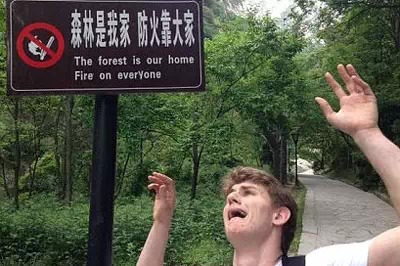
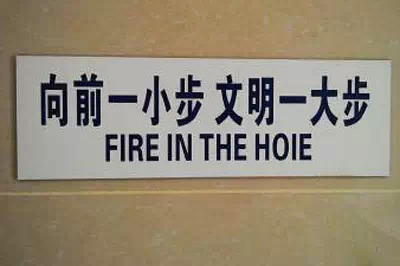
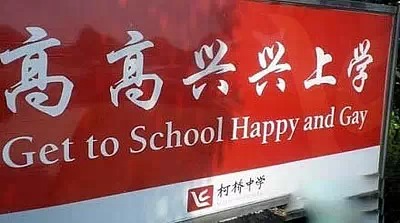
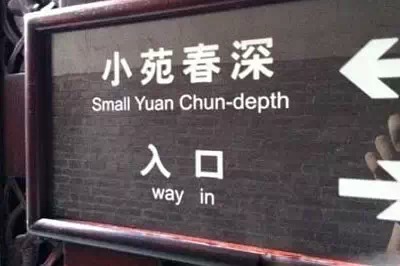
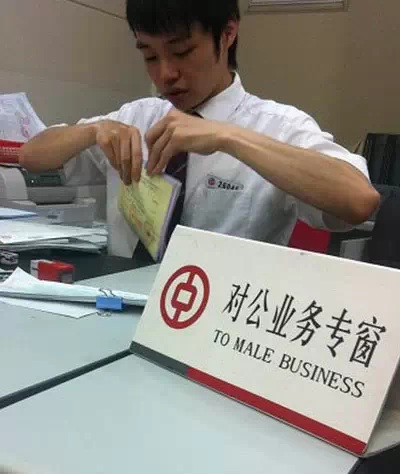
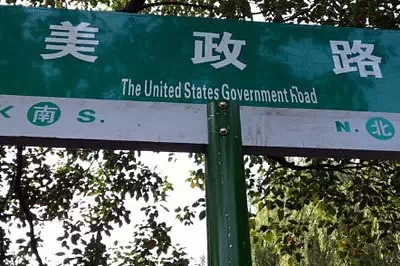
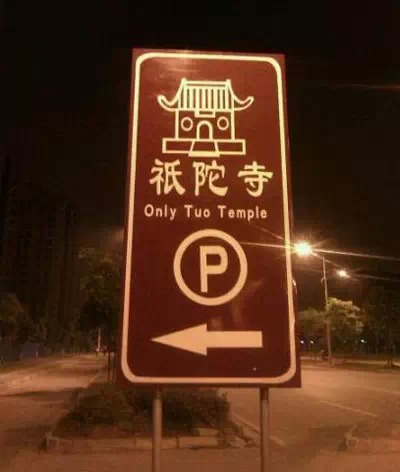
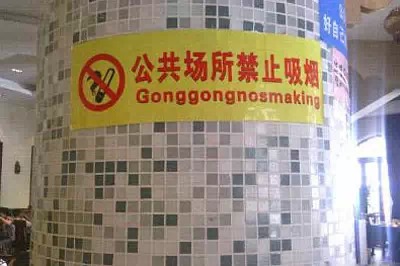
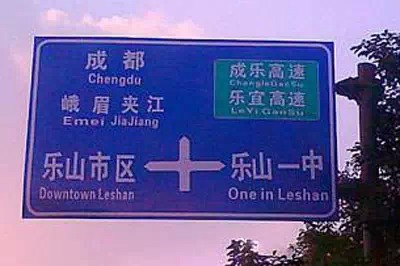
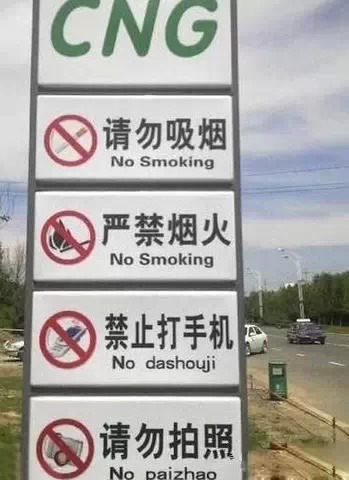
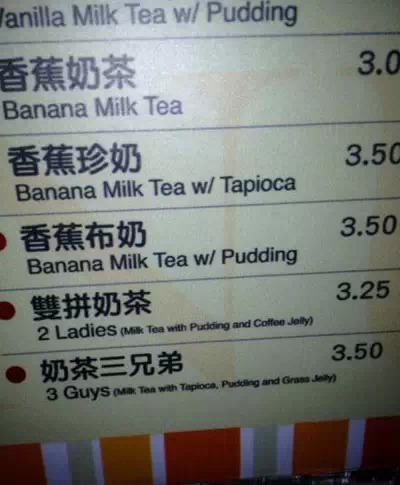
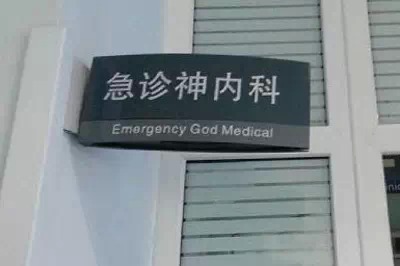
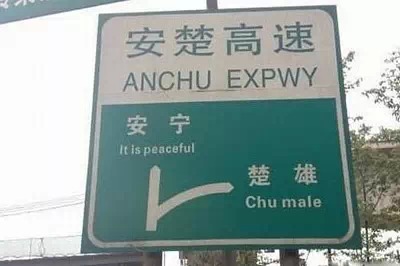
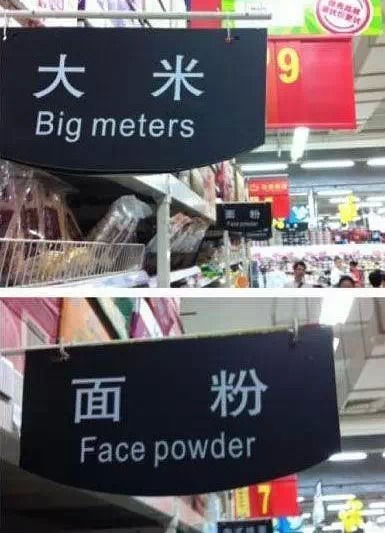
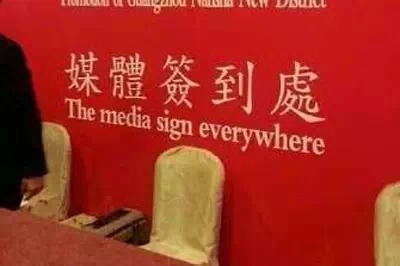
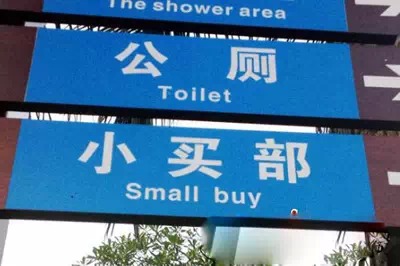
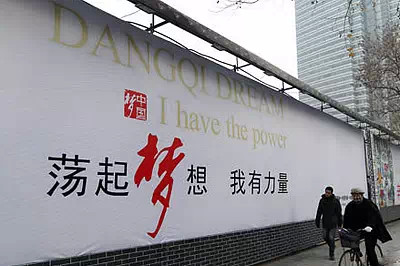
Bathrobe said,
September 21, 2015 @ 10:16 pm
The real reason is that nobody cares. English is just a 'decoration' for most people.
For those who think English is cool, it's sufficient that it should be in the Roman alphabet (much like people in the West who want Chinese or Japanese tattoos).
For the bureaucrats it's just a matter of 'going through the motions' — very few care if it's properly done or not. This problem is endemic in China and doesn't just apply to English translations. You'll find it in Chinese attitudes to design (unused pedestrian overpasses to satisfy 'requirements'), production, safety, and the policing of traffic rules. It's not important until someone gets killed, and even then consequences can be minimised if you have connections.
Similar problems of translation exist in places like Inner Mongolia, where the law requires the Mongolian script to be featured alongside Chinese on shopfronts. For most people (especially non-Mongolian speakers) it's just a legal requirement to be satisfied in a perfunctory manner. Many signs do little more than directly transliterate the Chinese pronunciation. (Even 'McDonalds' is just maidanglau.) You can't expect much with the typical Chinese attitude to 'requirements'.
K Chang said,
September 22, 2015 @ 4:02 am
It's a lot like Japanese who use English words almost as decoration instead of actual words.
I am a fan of Initial D anime series, and in "Fourth Stage" (series 4), many of the lead-in songs was by M.O.V.E. whose rap-like lyrics are sprinkled with English words. This is lyrics from "Noizy Tribe" (Allegedly they also did an English version and it is virtually incomprehensible)
Now listen ya'll what you waitin' for is the Noizy Tribe
ふりほどきたくて 外す胸の安全装置(セーフティー)
ゆれる想いをつかまえて そうkissをして
そういつもプレッシャー ぎゅうぎゅうに揺られた電車
よどんだ目した人ゴミから みてろぜってーいつか ほら電光石火
飛び出しあのチェッカーフラッグ手に入れる そう信じて
抱きたい夢がみえるでしょう この腕に感じたい your soul
This moment I can feel 前兆到来を知る
このままいくぜI'm the Noizy Tribe
If my ears are correct, セーフティー is pronounced saaafutee (i.e. safety).
And yes, I did spell "noizy" the way they did.
K. Chang said,
September 22, 2015 @ 3:34 pm
Also reminded me these American song title translations I found on reddit, supposedly came from various Chinese online forums:
We Found Love
潍坊的爱
Where Have You Been
威海油饼
Uptown Funk
东北里面就是玩儿 (Don't believe me just watch)
We Are The Champions
我们都是昌平人
Love The Way You Lie
爱你仆街的那条路 OR 爱你躺着的方式
Rolling in the Deep
往深里滚 (NOTE: There is a ShenLi River in China)
Somebody That I Used to Know
有些人,我用过了才知道!
Yesterday Once More
耶稣他爹玩什么 OR 好,今天人家还要 (Yes! Today once more)
Wake Me Up When September Ends
一觉睡到国庆节
Hotel California
加州招待所
Take Me Home, Country Road
我回家走国道~
As Long As You Love Me
越长越爱你
I Wanna Go
爱网购
Geof said,
September 23, 2015 @ 10:12 pm
Why would you pay for professional translators? They charge so much, and we need it done in 30 minutes! Just give it to Xiao-Li down the hall, he spent six months in the US, that's good enough!
God, sometimes I wonder why I bothered becoming a translator.
K Chang said,
September 24, 2015 @ 5:31 pm
For those who don't read Chinese and thus "get the joke", I'll go ahead and ruin it for you
We Found Love
潍坊的爱 = Love of Weifang (Weifan de ai)
Where Have You Been
威海油饼 = oily biscuit of Weihai (weihai youbin)
Uptown Funk
东北里面就是玩儿 (Don't believe me just watch) = the toy is to the northeast
We Are The Champions
我们都是昌平人 = We are from Changping
Love The Way You Lie
爱你仆街的那条路 OR 爱你躺着的方式 = Love the road you laid flat on / Love the way you lie down
Rolling in the Deep
往深里滚 (NOTE: There is a ShenLi River in China) = Roll to Shenli
Somebody That I Used to Know
有些人,我用过了才知道!= Some people, I only know after I used them
Yesterday Once More
耶稣他爹玩什么 OR 好,今天人家还要 = Jesus his dad play what (ye-su ta-die wan-seme) / Yes today once more
Wake Me Up When September Ends
一觉睡到国庆节 = let me sleep till National Day (Oct 1st)
Hotel California
加州招待所 = California Hotel
Take Me Home, Country Road
我回家走国道~ = I went home on National Highway
As Long As You Love Me
越长越爱你 = the longer I am, the more I love you
I Wanna Go
爱网购 = love to shop online (ai wang go)